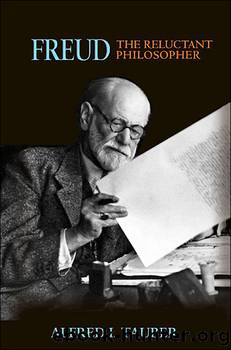Freud, the Reluctant Philosopher by Tauber Alfred I.; Tauber Alfred I. I.;

Author:Tauber, Alfred I.; Tauber, Alfred I. I.; [Tauber, Alfred I.]
Language: eng
Format: epub
ISBN: 544783
Publisher: Princeton University Press
Published: 2010-11-15T00:00:00+00:00
The Moral Structure of the Will
Nietzsche, as Kant before him, created his philosophy with the goal of establishing a basis for human freedom. The biological conception of human nature served a descriptive function in Nietzscheâs thought, in which he portrayed human vitality and creativity as fully expressed for human flourishing only in the free exercise of the Will. On this view, Nietzsche transformed the Will to Power from blind biological force to the foundation of human freedom and ultimately the creative basis of self-determination in human action (e.g., 1967a, 36, 366, 367). Thus, placing humans in nature goes well beyond identifying their instinctual character, and we misconstrue Nietzscheâs genealogy of morals if his philosophy is naturalized (as a Hobbsian, for example). While much of his ranting was directed towards a negative appraisal of Western ethics, described in terms of enslavement to an imposed morality, Nietzsche did so to clear the ground for an argument for individual independence. Such autonomy includes the responsibility of establishing freely chosen moral coordinates and then acting accordingly. Thus individual choice, both in prescription and in action, defined his vision of the moral. Ironically, then, he adopted the same orientation argued by Kant, namely, a radical autonomy, but obligation has shifted from satisfying a rational act to answering a biological imperative (which is both vital and creative).
In asserting individual autonomy as both the means and basis for fulfilling human potential, Nietzsche proclaimed, perhaps more clearly than any of his nineteenth-century forerunners, the sanctity of human choice. Indeed, grounding individual action in a biology of human nature marks a significant change in conceptualizing human identity, and âautonomyâ thereby assumes a new definition, one quite different from that formulated by Kant. Freud accepted the possibility of individual freedom, but that freedom was viewed much more narrowly. The individual is subject not only to the determinism of the unconscious, namely, the tyranny of the ever-present instincts, but to past experience and the injunction of a moral conduct impressed on the impressionable person. For Freud, freedom resides elsewhere.
This difference points to an important divergence in the underlying metaphysics governing the respective conceptions of human agency presented by Nietzsche and Freud. Both saw civilized humans as damaged, and more, each regarded the problems of civilization as resulting in nihilism and neurosis, respectively (Brown 1959, 82-84): Nietzsche regarded the suppression of a vitalizing natural Will as the cause of sickness and a distortion of life, and Freud saw the consequences of repression as symptoms of illness (Tauber and Podolsky 1999). However, while both concur that the revolt from nature results in sickness, for Nietzsche a return to nature offers health; for Freud, no such option exists, and instead he sought a more effective means to deal with the perpetual conflict of reason and Will. From these differing positions, divergent ethics emerged.
Nietzsche developed the Will to Power in multifarious ways. Controversy irrepressibly persists in the dispute over what is philosophy, poetics, metaphor, or psychology, but little doubt exists that he utilized biology to provide the language from which to critique nihilism and establish his new ethics.
Download
This site does not store any files on its server. We only index and link to content provided by other sites. Please contact the content providers to delete copyright contents if any and email us, we'll remove relevant links or contents immediately.
Blood and Oil by Bradley Hope(1464)
Wandering in Strange Lands by Morgan Jerkins(1283)
Ambition and Desire: The Dangerous Life of Josephine Bonaparte by Kate Williams(1279)
Daniel Holmes: A Memoir From Malta's Prison: From a cage, on a rock, in a puddle... by Daniel Holmes(1251)
It Was All a Lie by Stuart Stevens;(1193)
Twelve Caesars by Mary Beard(1139)
The First Conspiracy by Brad Meltzer & Josh Mensch(1076)
What Really Happened: The Death of Hitler by Robert J. Hutchinson(1070)
London in the Twentieth Century by Jerry White(1050)
Time of the Magicians by Wolfram Eilenberger(1027)
Twilight of the Gods by Ian W. Toll(1023)
The Japanese by Christopher Harding(1018)
A Woman by Sibilla Aleramo(1004)
Cleopatra by Alberto Angela(999)
Lenin: A Biography by Robert Service(982)
The Devil You Know by Charles M. Blow(932)
Reading for Life by Philip Davis(927)
1965--The Most Revolutionary Year in Music by Andrew Grant Jackson(872)
The Life of William Faulkner by Carl Rollyson(867)
